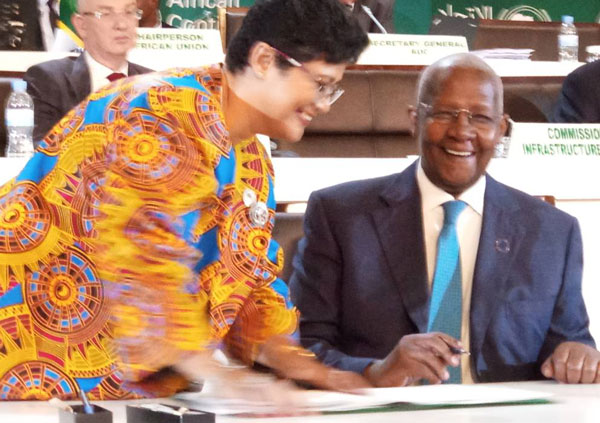
Kigali, Rwanda | AFP | Forty-four African countries have signed an agreement establishing a free trade area seen as vital to the continent’s economic development, the head of the African Union said Wednesday.
The creation of a free trade area — billed as the world’s largest in terms of participating countries — comes after two years of negotiations, and is one of the AU’s flagship projects for greater African integration.
“The agreement establishing the CFTA (African Continental Free Trade Area) was signed by 44 countries,” said Moussa Faki Mahamat, chairman of the AU commission.
The Signing Ceremony at #AfCFTA2018:
37. The Minister of Foreign Affairs of Uganda signs the #AfCFTA agreement, free movement protocol and the Kigali Declaration. pic.twitter.com/ar9BVMOLkT
— RBA (@rbarwanda) March 21, 2018
However, the agreement will still have to be ratified at a national level, and is only due to come into force in 180 days.
Nigeria is notably absent from the signatories after President Muhammadu Buhari pulled out of this week’s launch in Rwanda saying he needed more time for consultations at home.
One of Africa’s largest markets, Nigeria hesitated after objections from business leaders and unions — a sign that getting the deal through scores of national parliaments may face several hurdles.
“Some countries have reservations and have not finalised their national consultations. But we shall have another summit in Mauritania in July where we expect countries with reservations to also sign,” said Albert Muchanga, the AU Commissioner for Trade and Industry.
However other economic powerhouses South Africa, Kenya, Morocco, Egypt, Ethiopia and Algeria — known for strict protectionist policies restricting imports and exports — did sign the deal.
If all 55 African Union members eventually sign up, it will create a bloc with a cumulative GDP of $2.5 trillion (2 trillion euros) and cover a market of 1.2 billion people.
President Kagame concludes: This is not just a signing ceremony. Today’s deliberations are critically important as we chart the next steps on our journey toward the Africa we want. Once again Excellencies, I welcome you and wish us all a productive Summit #AfCFTA2018 pic.twitter.com/yKGbZuVon1
— Presidency | Rwanda (@UrugwiroVillage) March 21, 2018
Currently, African countries only do about 16 percent of their business with each other, the smallest amount of intra-regional trade compared to Latin America, Asia, North America and Europe.
And with average tariffs of 6.1 per cent, businesses currently pay higher tariffs when they export within Africa than when they export outside it, according to the AU.
“If we remove customs and duties by 2022, the level of intra-African trade will increase by 60 percent, which is very, very significant,” Muchanga told AFP in an interview before the summit.
 The Independent Uganda: You get the Truth we Pay the Price
The Independent Uganda: You get the Truth we Pay the Price



